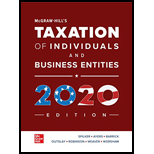
Compare and contrast different ways in which a taxpayer triggers a realization event by disposing of an asset.
Compare and contrast the different ways in which a taxpayer stimulates a realization event by disposing of an asset.
Explanation of Solution
By disposal of an asset, a taxpayer stimulates a realization event in the following manner:
Usually a realization event for tax purposes is made in several ways. Thus, any disposal of an asset will end in a sale or other disposition. These include a sale, gift to charity, trade, disposal to the landfill, or devastation in a natural disaster.
Under a sale or trade exchange event, the taxpayer receives something as compensation (in value) in return for the asset. Whereas, for a disposal, charitable contribution, or destruction from a natural disaster the tax payer will results in a loss of any remaining basis in the asset without compensation, unless and until it is reimbursed by insurance.
Want to see more full solutions like this?
Chapter 11 Solutions
MCGRAW-HILL'S TAX.OF INDIV.+BUS.2020
- Please provide the correct answer to this general accounting problem using accurate calculations.arrow_forwardPlease provide the accurate answer to this general accounting problem using valid techniques.arrow_forwardCan you help me solve this general accounting problem using the correct accounting process?arrow_forward
- I need help with this general accounting problem using proper accounting guidelines.arrow_forwardI am looking for help with this general accounting question using proper accounting standards.arrow_forwardI need help finding the accurate solution to this general accounting problem with valid methods.arrow_forward
- Solve this Accounting problemarrow_forwardCan you explain the correct methodology to solve this general accounting problem?arrow_forwardExplore the role of the accounting profession in supporting the effective governance and internal control structures of organizations. Discuss the responsibilities of accountants in ensuring accurate financial reporting, deterring fraudulent activities, and promoting ethical decision-making within the entities they serve. Additionally, consider the challenges faced by accountants when navigating potential conflicts between their professional obligations and the interests of management or other stakeholders.arrow_forward
 Individual Income TaxesAccountingISBN:9780357109731Author:HoffmanPublisher:CENGAGE LEARNING - CONSIGNMENT
Individual Income TaxesAccountingISBN:9780357109731Author:HoffmanPublisher:CENGAGE LEARNING - CONSIGNMENT





